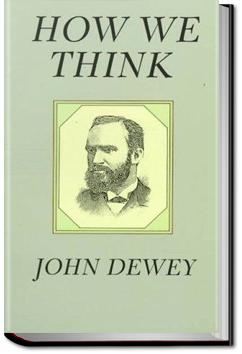UNLIMITED Audiobooks and eBooks
Over 40,000 books & works on all major devices
Get ALL YOU CAN for FREE for 30 days!
How We Think
John Dewey
Book Overview:
A book written by an American education philosopher in which he proposed “This scientific attitude of mind might, conceivably, be quite irrelevant to teaching children and youth. But this book also represents the conviction that such is not the case; that the native and unspoiled attitude of childhood, marked by ardent curiosity, fertile imagination, and love of experimental inquiry, is near, very near, to the attitude of the scientific mind. If these pages assist any to appreciate this kinship and to consider seriously how its recognition in educational practice would make for individual happiness and the reduction of social waste, ...”
A book written by an American education philosopher in which he proposed “This scientific attitude of mind might, conceivably, be quite irrelevant to teaching children and youth. But this book also represents the conviction that such is not the case; that the native and unspoiled attitude of childhood, marked by ardent curiosity, fertile imagination, and love of experimental inquiry, is near, very near, to the attitude of the scientific mind. If these pages assist any to appreciate this kinship and to consider seriously how its recognition in educational practice would make for individual happiness and the reduction of social waste, ...”
How does All You Can Books work?
All You Can Books gives you UNLIMITED access to over 40,000 Audiobooks, eBooks, and Foreign Language courses. Download as many audiobooks, ebooks, language audio courses, and language e-workbooks as you want during the FREE trial and it's all yours to keep even if you cancel during the FREE trial. The service works on any major device including computers, smartphones, music players, e-readers, and tablets. You can try the service for FREE for 30 days then it's just $19.99 per month after that. So for the price everyone else charges for just 1 book, we offer you UNLIMITED audio books, e-books and language courses to download and enjoy as you please. No restrictions.
Try now for FREE!

"Love your service - thanks so much for what you do!"
- Customer Cathryn Mazer
"I did not realize that you would have so many audio books I would enjoy"
- Customer Sharon Morrison
"For all my fellow Audio Book & E-Book regulars:
This is about as close to nirvana as I have found!"
- Twitter post from @bobbyekat



Community Reviews
Every teacher, thinker and writer should read this book. It's a very accessible discussion of what it means to think and what it means to be a true educator. Dewey also provides a framework for analyzing your own biases and assumptions and the way those have inappropriately influenced conclusions on
In this short book Dewey shows what pragmatist learning theory means for epistemology (what it means to think well) and for pedagogy (the study of teaching and learning). The starting point is a mind already active, curious and interested in what's going on around it, that, given the chance, will fi
I guess it's a worthwhile read for a different perspective on thought, but it is a struggle to get through as it is so uninteresting. It also seems that this book could have been about half the length that it is since it tends to be repetitive.
Đọc vào dịp nghỉ lễ tránh dịch, đi làm, có cơ hội thực hành vài điều
Đọc lần 2, không hấp thụ được nhiều như lần đầu. Just like a tip of the iceberg
" Natural intelligence is no barrier to the propagation of error, nor large but untrained experience to the accumulation of fixed false beliefs. Errors may support one another mutually and weave an ever larger and firmer fabric of misconception"
"Curiosity rises above the organic and the social plane
Cuối cùng thì cũng đọc xong cuốn sách hại não nhất năm 2018 :)) chắc phải mở tiệc =))
#Review: Cách Ta Nghĩ (How we think)
Điểm nội dung: 9,5/10
Bạn muốn tư duy của mình thêm sâu sắc? Bạn quan tâm đến tâm lý giáo dục? Bạn có đủ sự kiên nhẫn để cố gắng đọc những lý thuyết khô khan và trừu tượng? Bạn
My house lost power in a recent storm, and, luckily, my kindle managed to keep me entertained during the nights. One night, since it was dark and I could not go back to reading my copy of Foucault, I read this.
This was the first John Dewey I've actually read. I believe that at some point in my colle
I am not saying that I did not enjoy this book. I am just going to say that I have pretty much decided that all philosophy is turning into is a giant rolling sweep of defining terms. I understand the role that language plays in how we communicate as human beings. I understand that spending a chapter
Four stars if I rate it on how well it achieves what it sets out to, which would be fair; but three stars based on how it achieves what I wanted it to, which is not fair at all. Sorry.
How We Think provides a thorough walk-through of what is involved in what I want to call reasoning - roughly: the su